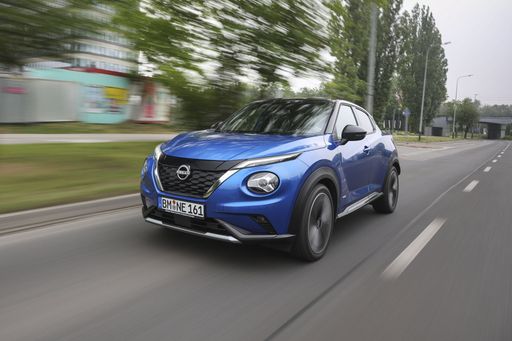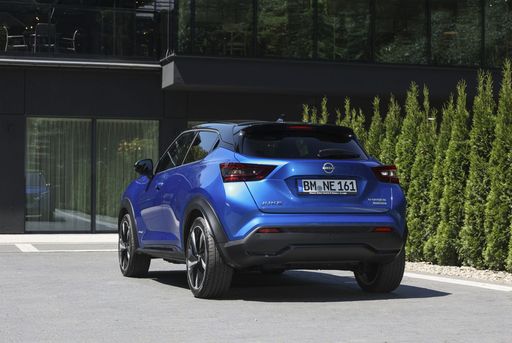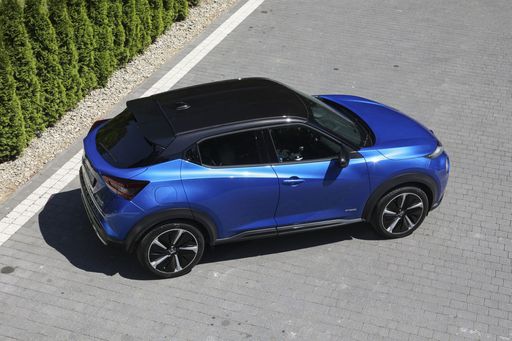Nissan Juke vs Toyota Yaris - Differences and prices compared
Compare performance (143 HP vs 280 HP), boot space and price (21400 £ vs 21900 £ ) at a glance. Find out which car is the better choice for you – Nissan Juke or Toyota Yaris?
Costs and Efficiency:
When it comes to price and running costs, the biggest differences usually appear. This is often where you see which car fits your budget better in the long run.
Nissan Juke has a slight advantage in terms of price – it starts at 21400 £ , while the Toyota Yaris costs 21900 £ . That’s a price difference of around 472 £.
Fuel consumption also shows a difference: Toyota Yaris manages with 3.80 L and is therefore clearly perceptible more efficient than the Nissan Juke with 4.70 L. The difference is about 0.90 L per 100 km.
Engine and Performance:
Power, torque and acceleration say a lot about how a car feels on the road. This is where you see which model delivers more driving dynamics.
When it comes to engine power, the Toyota Yaris has a significantly edge – offering 280 HP compared to 143 HP. That’s roughly 137 HP more horsepower.
In acceleration from 0 to 100 km/h, the Toyota Yaris is clearly quicker – completing the sprint in 5.50 s, while the Nissan Juke takes 10.10 s. That’s about 4.60 s faster.
There’s also a difference in torque: Toyota Yaris pulls convincingly stronger with 390 Nm compared to 200 Nm. That’s about 190 Nm difference.
Space and Everyday Use:
Cabin size, boot volume and payload all play a role in everyday practicality. Here, comfort and flexibility make the difference.
Both vehicles offer seating for 5 people.
In curb weight, Toyota Yaris is somewhat lighter – 1090 kg compared to 1274 kg. The difference is around 184 kg.
In terms of boot space, the Nissan Juke offers evident more room – 422 L compared to 286 L. That’s a difference of about 136 L.
When it comes to payload, Toyota Yaris slightly takes the win – 525 kg compared to 427 kg. That’s a difference of about 98 kg.
Who wins the race in the data check?
The Toyota Yaris is decisively ahead in the objective data comparison.
This result only shows which model scores more points on paper – not which of the two cars feels right for you.
Costs and Consumption
View detailed analysis
Engine and Performance
View detailed analysis
Dimensions and Body
View detailed analysis

Toyota Yaris
Nissan Juke
The Nissan Juke is a pocket-sized crossover that refuses to blend in, with quirky styling and a cheeky stance that turns heads at every traffic light. It’s ideal for shoppers who value personality and nimble urban driving over maximum practicality, delivering surprising pep and a well-equipped feel for everyday fun.
details



Toyota Yaris
The Toyota Yaris is a sprightly city hatch that packs clever packaging, surprising comfort and fuel-sipping manners into a neat, easy-to-park package. It rewards sensible buyers with low running costs, friendly ergonomics and a forgiving drive, delivered with Japanese reliability and just enough personality to make errands feel a little less ordinary.
details

Costs and Consumption |
|
|---|---|
|
Price
21400 - 31800 £
|
Price
21900 - 46700 £
|
|
Consumption L/100km
4.7 - 6 L
|
Consumption L/100km
3.8 - 9.5 L
|
|
Consumption kWh/100km
-
|
Consumption kWh/100km
-
|
|
Electric Range
-
|
Electric Range
-
|
|
Battery Capacity
-
|
Battery Capacity
-
|
|
co2
105 - 136 g/km
|
co2
87 - 215 g/km
|
|
Fuel tank capacity
-
|
Fuel tank capacity
36 - 50 L
|
Dimensions and Body |
|
|---|---|
|
Body Type
SUV
|
Body Type
Hatchback
|
|
Seats
5
|
Seats
4 - 5
|
|
Doors
-
|
Doors
3 - 5
|
|
Curb weight
1274 - 1405 kg
|
Curb weight
1090 - 1356 kg
|
|
Trunk capacity
354 - 422 L
|
Trunk capacity
141 - 286 L
|
|
Length
-
|
Length
3940 - 3995 mm
|
|
Width
1800 mm
|
Width
1745 - 1805 mm
|
|
Height
-
|
Height
1455 - 1500 mm
|
|
Max trunk capacity
-
|
Max trunk capacity
935 L
|
|
Payload
405 - 427 kg
|
Payload
289 - 525 kg
|
Engine and Performance |
|
|---|---|
|
Engine Type
Petrol, Full Hybrid
|
Engine Type
Full Hybrid, Petrol
|
|
Transmission
Manuel, Automatic
|
Transmission
Automatic, Manuel
|
|
Transmission Detail
Manual Gearbox, Dual-Clutch Automatic, Automatic Gearbox
|
Transmission Detail
CVT, Manual Gearbox, Automatic Gearbox
|
|
Drive Type
Front-Wheel Drive
|
Drive Type
Front-Wheel Drive, All-Wheel Drive
|
|
Power HP
114 - 143 HP
|
Power HP
116 - 280 HP
|
|
Acceleration 0-100km/h
10.1 - 11.8 s
|
Acceleration 0-100km/h
5.5 - 9.7 s
|
|
Max Speed
-
|
Max Speed
175 - 230 km/h
|
|
Torque
200 Nm
|
Torque
390 Nm
|
|
Number of Cylinders
3 - 4
|
Number of Cylinders
3
|
|
Power kW
84 - 105 kW
|
Power kW
85 - 206 kW
|
|
Engine capacity
999 - 1598 cm3
|
Engine capacity
1490 - 1618 cm3
|
General |
|
|---|---|
|
Model Year
2025
|
Model Year
2024 - 2025
|
|
CO2 Efficiency Class
D, E, C
|
CO2 Efficiency Class
B, G
|
|
Brand
Nissan
|
Brand
Toyota
|
What drive types are available for the Nissan Juke?
Available configurations include Front-Wheel Drive.
